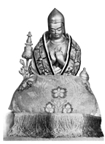Dipankar Srijnan, Atish

Dipankar Srijnan, Atish (980?-1053) Buddhist scholar, religious preceptor and philosopher, son of Kalyanasree and Prabhavati Devi, was born in Vajrayogini village, vikramapura. Considerable difference of opinion exists regarding his date of birth and death. However most of the Buddhist scholars suggest that he was born in c. 980 or 982/983 AD. His childhood name was Chandragarbha. He was initially a tantrik and was initiated into buddhism only later in life. Dipankar studied at home with his mother before going to the local Vajrasana Vihara. He studied Buddhism and the Buddhist scriptures under Jetari, a Buddhist scholar. Subsequently, renouncing earthly ties, he left his family to acquire knowledge through religion. He journeyed to northern India and became a disciple of Rahul Gupta. After acquiring knowledge of Buddhist mysticism, he was given the title Guhyajvanavajra. He was named Dipankar Srijnan after initiation into Buddhism by Acharya Shilarakshita, the chancellor and eminent counsellor of Odantapuri Vihara of Magadha. When Atish was thirty-one, he was raised to the highest rank of Bhikkhus by Acharya Dharmarakshita.
In 1011 AD, Dipankar, along with more than 100 disciples, went to Suvarnadwipa (modern Malayasia) and became a disciple of Acharya Chandrakirti, under whom he studied the various branches of Buddhism for twelve years. He then returned to Magadha where he met great Buddhist scholars who all acknowledged his superior knowledge and scholarship.
Gradually, Dipankar became renowned as a scholar. The Pala king, Mahipala, appointed him Chancellor of Vikramashila Mahavihara in Bhagalpur, Bihar.
In addition to his duties here, Dipankar was Professor and Chancellor for 15 years of Odantapuri and Somapura Viharas. It is believed that during his stay at somapura mahavihara he translated Madhyamakaratnapradipa. War broke out at this time between Nayapala, son of Mahipala, and Laksmikarna, king of Kalachuri. Dipankar's mediation helped to terminate hostilities and establish peace.
Shortly thereafter, the Buddhist king of Tibet, Lah Lama Yiyosi Hod (Lah Lama-ye-shes), invited Dipankar to Tibet to spread the message of Buddha. Despite the promise of great honours, Dipankar declined. After the demise of King Lah Lama, his nephew, Chang Chub (Chyan-Chub) Jnanaprabha, became the king of Tibet. He renewed the invitation made earlier. This time Dipankar accepted the offer and, accompanied by a few distinguished scholars, commenced his journey to Tibet in 1040 AD. He was warmly received along the way. In Nepal, King Anantakirti welcomed Dipankar, who founded Khana Vihara and initiated the Nepalese prince, Padmaprabha, into Buddhism.
King Chang Chub arranged a royal reception to welcome Dipankar to Tibet. An artist's depiction of this reception may still be seen on the walls of a Buddhist monastery there. A musical instrument, Ragaduna, was invented in honour of Dipankar.
Making Tho-Ling Vihara his headquarters, Dipankar traveled all over Tibet, preaching Buddhism. His endeavours helped remove tantric elements from Buddhism. Thus, Dipankar reformed Buddhism according to the mahayana system and established the Buddhist Ka-dam (Ge-lug) sect.
Tibetans revere Dipankar, granting him a rank second only to Gautam Buddha and refer to him as Jobo Chhenpo (a great god). The lamas of Tibet, who hold political and religious power, feel proud to be introduced as disciples and heirs of Dipankar. The influence of Dipankar is still felt in the religion and culture of Tibet.
Dipankar wrote, translated and edited more than two hundred books, which helped spread Buddhism in Tibet. He discovered several sanskrit manuscripts in Tibet and copied those himself. He translated many books from Sanskrit to Bhot (Tibetan). He also wrote several books on Buddhist scriptures, medical science and technical science in Bhot. Dipankar wrote several books in Sanskrit, but only their Tibetan translations are extant now. Dipankar earned considerable fame with Tyavjur, in which 79 of his books have been preserved in Tibetan translation. Among his books are Vodhipathapradipa, Charyasanggrahapradipa, Satyadvayavatara, Vodhisattvamanyavali, Madhyamakaratnapradipa, Mahayanapathasadhanasanggraha,Shiksasamuchchaya Abhisamya, Prajvaparamitapindarthapradipa, Ekavirasadhana, Vimalaratnalekha etc. Vimalaratnalekha is a Sanskrit letter to Nayapala, king of Magadha. Charyasamgrahapradipa contains some kirtan verses composed by Dipankar.
After staying for thirteen years in Tibet, Dipankar died in 1053 AD in a village called Lethan, near Lhasa, at the age of 73. The site of his last rites at Lethan has turned into a shrine. His ashes were brought to Dhaka on 28 June 1978 and placed in Dharmarajika Bauddha Vihara. His birthplace, Vajrayogini, is still known as nastik panditer bhita (homestead of an atheist scholar). [Kanailal Ray]
